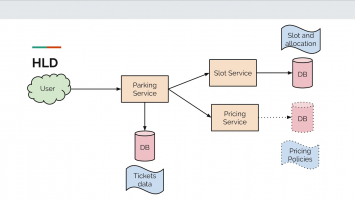Top 7 Best Online Operations Research Courses
Businesses must make critical decisions at every corner of their journey towards prosperity. One wrong step and all progress so far is zero due to competition. ... read more...In this day and age, when market trends are constantly changing, Operations Research is here to support every business. If you are interested in exploring the field to work as a business analyst, then this list of best online operations research courses is all you need. experience. This list also includes free research resources, so dive in! Take a look at compilation of Business Courses.
-
Operations Research (3): Theory ranks first in the list of best online operations research courses. Operations Research (OR) is a branch of mathematics and engineering that studies optimization problems in Business and Management, Economics, Computer Science, Civil Engineering, Electrical Engineering, and other fields. The three-part course series focuses on deterministic optimization techniques, which are an important part of the field of OR. In this third installment, let look at the mathematical properties of linear programs, integer programs, and nonlinear programs. They also discuss how these theoretical properties can help them develop better ways to solve mathematical programs.
What you will learn:
- Understand the theoretical properties of linear programs, integer programs, and nonlinear programs.
- Apply the mathematical properties to reduce the complexity of real-world problems or to solve it.
Information about the course:
- Flexible deadlines: Reset deadlines based on your availability.
- Shareable Certificate: Get a Certificate when you complete
- 100% online: Start now and learn at times that suit you.
- Advanced Level: This course is appropriate for students with experience Calculus, Linear Algebra, and Probability.
- Approx. 2 p.m. to complete
- Subtitles: English
Rating: 5.0/5.0
Enroll here: coursera.org/learn/operations-research-theory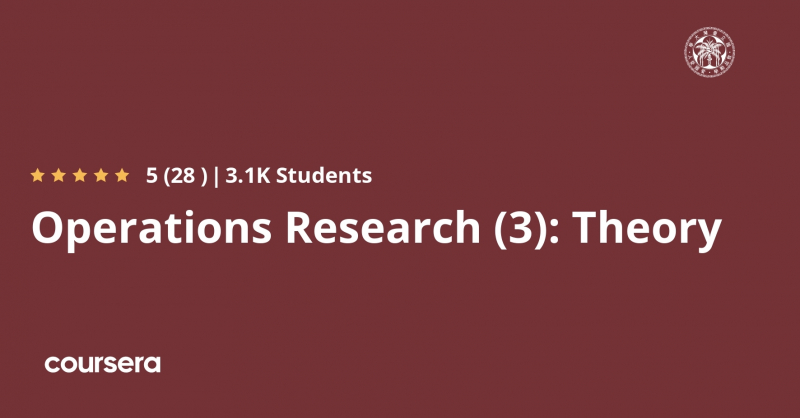
coursera.org -
Operations Research (2): Optimization Algorithms ranks 2nd in the list of best online operations research courses. Operations Research (OR) is a branch of mathematics and engineering that studies optimization problems in Business and Management, Economics, Computer Science, Civil Engineering, Electrical Engineering, and other fields. The three-part course series focuses on deterministic optimization techniques, which are an important part of the field of OR.
In the second installment of this series, let look at some efficient algorithms for solving linear, integer, and nonlinear programs. They will also discuss an example of algorithm application as well as the basic computer implementation of solving different programs, integer programs, and nonlinear programs.
What you will learn:
- Learn how to use algorithms to solve different types of optimization programs.
- Learn how to use Gurobi solver with Python to solve these problems efficiently.
- Flexible deadlines: Reset deadlines based on your availability.
Information about the course:
- Shareable Certificate: Get a Certificate when you complete
- 100% online: Start now and learn at times that suit you.
- Intermediate level: For learners who have already taken basic operations research courses. Experience with calculus, linear algebra, and probability is suggested.
- Approx. 12 hours to complete
- Subtitles: English
Rating: 4.8/5.0
Enroll here: coursera.org/learn/operations-research-algorithms
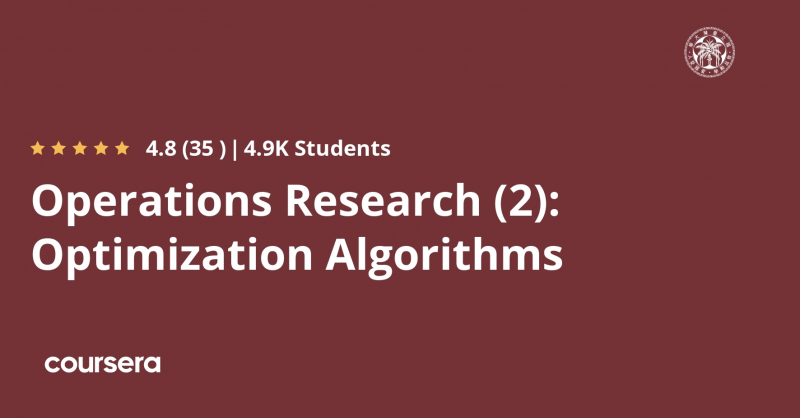
coursera.org 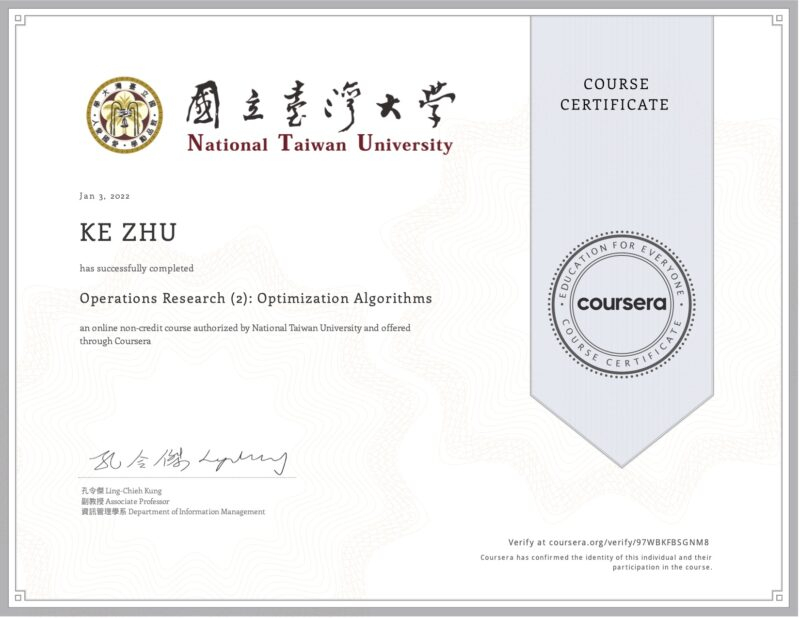
kzhu.ai -
Operations Research (1): Models and Applications ranks 3rd in the list of best online operations research courses. Operations Research (OR) is a branch of mathematics and engineering that studies optimization problems in Business and Management, Economics, Computer Science, Civil Engineering, Industrial Engineering, and other fields. This course introduces frameworks and concepts related to various types of optimization problems encountered in business. They concentrate on how to turn real-world business problems into mathematical models that computers can solve.
This lecture provides students with an overview of what they can expect from this course, including the basic concept and a brief history of Operations Research. Let's discuss how mathematical programming can be applied to real-world business problems. Linear programming (LP) is one of the most important methods for solving optimization problems. You can use LP models to make decisions about production, inventory, personnel scheduling, and so on.
Some optimization problems in many practical areas have integrality constraints imposed on some of the variables. Some examples include facility location, machine scheduling, and vehicle routing. Integer Programming (IP) is a mathematical method for solving these problems. In this lecture, let's look at a real-world business problem that the instructor solved using Operations Research. The issue is that a company must schedule its customer service representatives in order to minimize the overall amount of staff shortage. They will show the problem, the process of conducting an OR study, the integer programming formulation, and the outcome.What you will learn:
- Formulate different types of mathematical models to tackle optimization problems with business applications.
- Technically, the concepts and applications of Linear Programming, Integer Programming, and Nonlinear Programming will be delivered.
- Solve an optimization problem with one
of the most accessible software: Microsoft Excel.
Information about the course:
- Flexible deadlines: Reset deadlines based on your availability.
- Shareable Certificate: Get a Certificate when you complete
- 100% online: Start now and learn at times that suit you.
- Beginner level: This course is appropriate for beginners with no prior analytics experience.
- Approx. 11 hours to complete
- Subtitles: English
Rating: 4.8
Enroll here: coursera.org/learn/operations-research-modeling
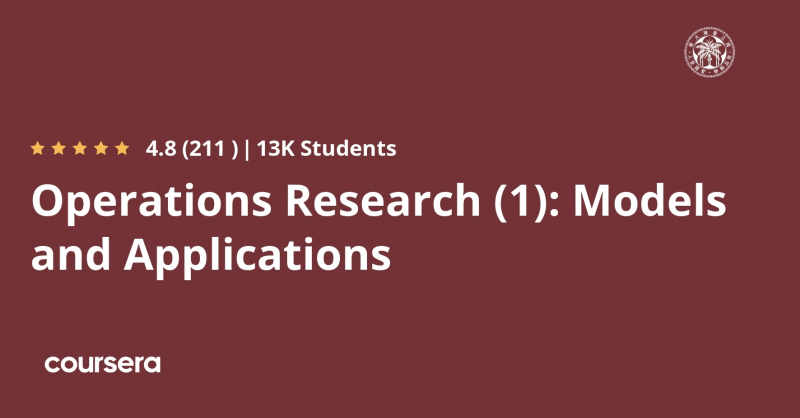
coursera.org -
Operations analysis ranks 4th in the list of best online operations research courses. This course is intended to change your perspective on transforming data into better decisions. Recent extraordinary advances in data-collection technologies have altered how businesses make informed and effective business decisions. The operations analytics course, taught by three of Wharton's top experts, focuses on how data can be used to profitably match supply and demand in a variety of business settings.
You will learn how to model future demand uncertainties, predict the outcomes of competing policy options, and choose the best course of action in the face of risk in this course. The course will introduce frameworks and ideas that provide insights into a spectrum of real-world business challenges, will teach you methods and software available for tackling these challenges quantitatively as well as the issues involved in gathering the relevant data.
Skills you will gain:
- Simulation
- Mathematical Optimization
- Solver
- Decision Tree
Information about the course:
- Flexible deadlines: Reset deadlines based on your availability.
- Shareable Certificate: Get a Certificate when you complete
- 100% online: Start now and learn at times that suit you.
- Course 2 of 5 in the: Business Analytics Specialization
- Approx. 10 hours to complete
- Subtitles: Arabic, French, Portuguese (European), Chinese (Simplified), Italian, Vietnamese, Korean, German,
- Russian, English, Spanish
Rating: 4.7/5.0
Enroll here: coursera.org/learn/wharton-operations-analytics
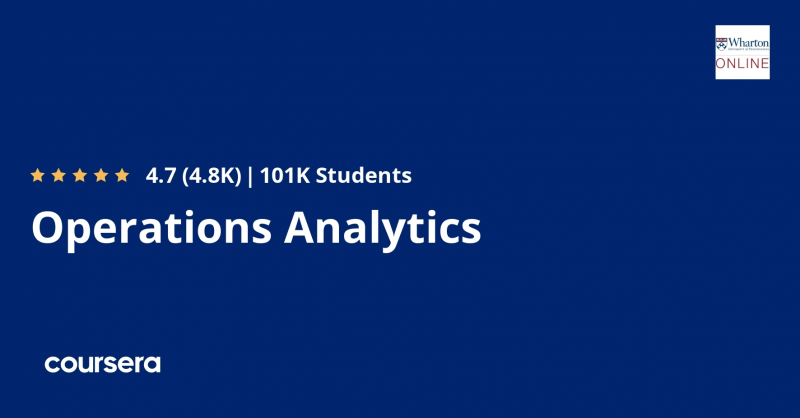
coursera.org -
Master of Science in Operations Research (Georgia Tech) ranks 5th in the list of best online operations research courses. Through a rigorous graduate-level coursework program, the Master of Science in Operations Research (MSOR) degree program focuses on the theory and practice of operations research. Students in the program can choose between introductory and advanced Ph.D. level courses based on their background and interests, with coursework focusing on deterministic and stochastic operations research with electives in statistics and data analytics.
The program, which can be completed in 12 to 16 months, is intended to provide students with proficiency in the principles and methods of operations research. Students work with faculty who are actively engaged in research and ready to teach the most recent advances in operations research. MSOR students do not write a research thesis, but they may apply for additional Ph.D. study.
The MSOR program is 30 credit hours long and includes core courses in ISyE, Math, and Computer Science. The remaining courses in the program are quite flexible; students in the program can focus their studies on a specific area of application such as Optimization, Statistics, Stochastics, Computational Science, and so on, or they can take more mathematical courses in preparation for a Ph.D. MSOR students are also encouraged to take one applied operations research course. Applicants typically have a bachelor's degree in engineering, mathematics, science, or computing and strong quantitative skills. It is not necessary to have prior experience in operations research.
Highlights
- Use mathematical models and statistical analysis tools to identify business problems and arrive at inventive solutions.
- Get on-demand lecture videos and learn at your pace to complete the MS program in the time given as per the credit hours.
- Earn a Master of Science in Operations Research to work with top-tier companies as a proficient analyst.
Rating: 4.4/5.0
Enroll here: isye.gatech.edu/academics/masters/operations-research

kdnuggets.com 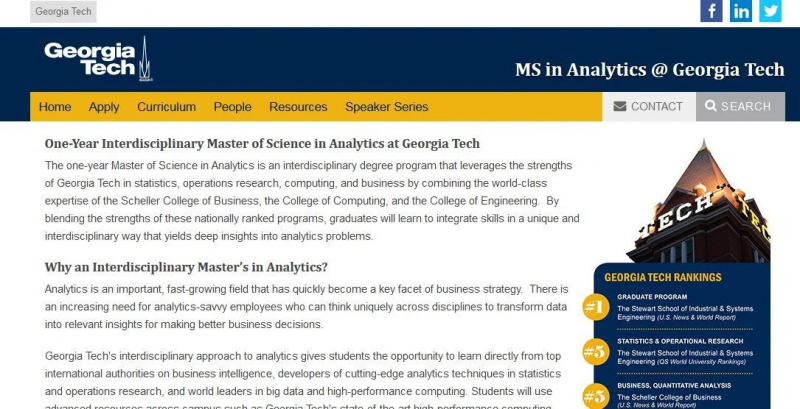
kdnuggets.com -
Operations Research Certification (Columbia University in the City of New York) ranks 6th in the list of best online operations research courses. Operations research is a branch of applied mathematics that deals with quantitative decision problems involving the allocation and control of limited resources. These issues arise in the operations of industrial firms, financial institutions, health care organizations, transportation systems, energy and resources, and government. The operations research analyst creates and applies mathematical and statistical models to assist in the resolution of these decision problems. They, like engineers, formulate and solve problems. Their work entails developing a mathematical model of a system as well as analyzing and forecasting the effects of various modes of operation. Mathematical optimization techniques, probabilistic and statistical methods, experiments, and computer simulations may all be used in the analysis.
When it comes to successfully evaluating and implementing projects, operation research plays a critical role in any company. To become an analyst and make informed decisions, you must have a thorough understanding of all business parameters supported by mathematical models. This can be accomplished by learning the necessary skills and tools for Operations Research. Columbia University has been providing programs in this field since 1952, making it one of the best places to begin your studies. You can get certified in Operations Research by taking four courses and earning 12 credit points through their online program. The certification can help you find lucrative job opportunities in the job market.
Highlights:
- Learn probability and statistics to understand optimization methods and models for decision making.
- Evaluate and estimate the resource utilization in your project to implement optimal business solutions.
- Learn about corporate financing, accounting, and investment banking if you want to work in Financial Management organizations.
- Earn Certification in four graduate-level courses to complete your education.
Rating: 4.4/5.0
Enroll here: cvn.columbia.edu/program/columbia-university-operations-research-certification-certificate
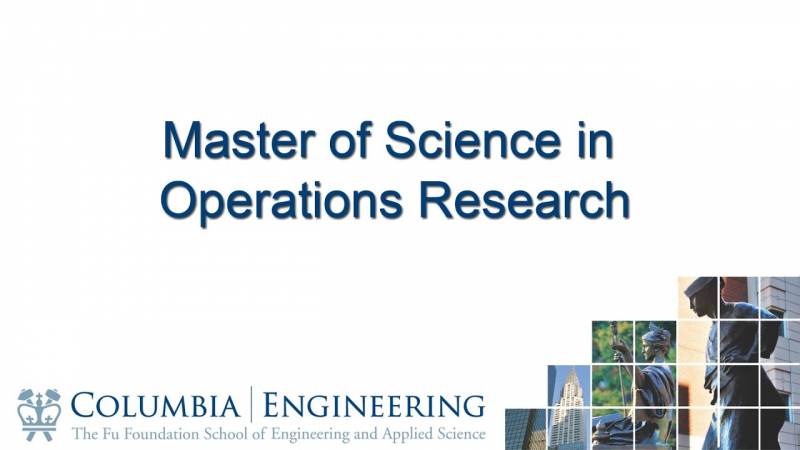
ieor.columbia.edu 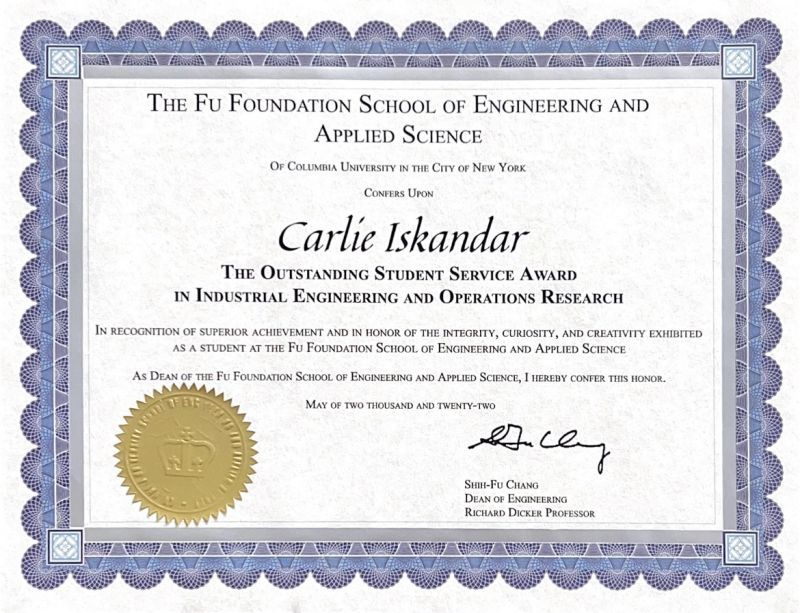
ieor.columbia.edu -
Operations Research: an Active Learning Approach ranks last in the list of best online operations research courses. Operations management is required in all sectors of society because it deals with operational planning and control issues. One of the challenges for operations managers is determining how to best use available resources to achieve a specific goal. Many of these problems necessitate the use of quantitative approaches. OR is concerned with the formulation of problems and the application of analytical methods to aid in the decision-making of operational problems in planning and control. OR techniques are useful quantitative tools for assisting operations managers, and they have a wide range of applications in engineering, manufacturing, construction, finance, and a variety of service sectors.
Operations Research is a branch of applied mathematics that is taught in many engineering and management programs. This course is intended for both students learning OR and practitioners in their respective professions. The mathematical procedures for the OR techniques are introduced in detail in the course examples. This assists learners in mastering the methodology and techniques and applying them to their goals through active learning.
This course introduces two popular OR techniques as well as their related topics. The Simplex Method for Linear Programming (LP) is regarded as one of the top ten algorithms of the twentieth century. LP is an optimization technique used to solve problems such as determining the best product mix, production schedule, and shipment allocation in order to maximize profit or minimize costs. The Critical Path Method (CPM) is a popular technique for scheduling project activities used by project managers. Some advanced CPM topics are also introduced to deal with specific project management situations.
At a glance
- Institution: HKPolyUx
- Subject: Business & Management
- Level: Intermediate
- Prerequisites:
- Knowledge of mathematics at high school level
- Knowledge of probability distributions and statistics, and preferably basic calculus, for learning Simulation
- Language: English
- Video Transcript: English
What you'll learn
- Understand and apply the methodology of Operations Research to investigate and tackle your operational problems;
- Formulate and apply the techniques of Linear Programming and the extended topics to solve certain optimization problems;
- Apply the techniques of Critical Path Method and PERT in project management;
- Appreciate the use of simulation in studying the behaviour of stochastic operations systems;
- Understand the limitations of these techniques.
Rating: 4.4/5.0
Enroll here: edx.org/course/operations-research-an-active-approach

youtube.com

























